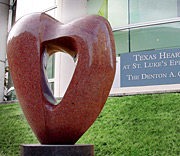Device Licensed From THI
to Control Bleeding Complications
Wins Innovation Prize
A Houston Technology Center
2013 Goradia Innovation Prize First Place
Houston, Texas (October 18, 2013) – A
company founded to promote new
technology designed to help prevent costly internal bleeding complications
associated with some common medical procedures, and licensed from the Texas Heart Institute (THI), is one of two companies awarded First Place
in the competition for the Houston Technology Center's (HTC) prestigious 2013
Goradia Innovation Prize.
During
its 2013 Innovation Conference and Showcase, the Houston Technology Center
(HTC), in collaboration with Opportunity Houston, awarded nearly $150,000 in
prize money to individual finalists and early-stage companies from the Texas
Gulf Coast region that have yet to largely commercialize their innovations. The
Goradia winners are selected based on their discovery's commercial potential, a
sound business plan, potential to contribute to local job growth, and
likelihood of business success in the long run. Saranas, Inc. was awarded
$30,000.
 Saranas,
Inc. was founded by its president, Dr. Mehdi Razavi, Director of
Electrophysiology Clinical Research for the Texas Heart Institute, and its
chief technology officer, Alex Arevalos, a Rice University doctoral candidate
and National Science Foundation scholar. Dr. Razavi and Mr. Arevalos are among
the technology's inventors, and Saranas has licensed this technology, including
rights under two issued patents. The concept is based on an "introducer sheath"
with embedded sensors that is connected to a real-time monitor so that doctors
can immediately tell if their patient is experiencing internal bleeding
complications.
Saranas,
Inc. was founded by its president, Dr. Mehdi Razavi, Director of
Electrophysiology Clinical Research for the Texas Heart Institute, and its
chief technology officer, Alex Arevalos, a Rice University doctoral candidate
and National Science Foundation scholar. Dr. Razavi and Mr. Arevalos are among
the technology's inventors, and Saranas has licensed this technology, including
rights under two issued patents. The concept is based on an "introducer sheath"
with embedded sensors that is connected to a real-time monitor so that doctors
can immediately tell if their patient is experiencing internal bleeding
complications.
More than 19 million patients a year in the
U.S. undergo a variety of medical procedures requiring access to their blood
vessels. These include cardiac procedures, kidney dialysis, chemotherapy,
and many others. For many possible reasons, including that the initial needle
insertion sometimes punctures the back wall of the blood vessel, these medical
procedures have been documented to experience a significant bleeding
complication in 4% to 18% of the cases. These complications represent only those
patients
whose bleeding has been so severe as to require blood transfusion, and lesser
bleeding also occurs in such patients.
In
many cases, these complications go unfixed because they are undetectable at the
time of the procedure, but become very clinically important shortly afterward.
Studies have shown that such vascular access bleeding complications can lead to
worse patient outcomes, longer hospital stays, and/or to additional and more
costly medical tests and procedures to detect and correct the bleeding
problems.
"Undetected
internal bleeding during any procedure requiring access to blood vessels is the
leading complication, but if detected in real time it can be controlled quite
easily," said Dr. Razavi. "This new device functions as the canary in the coal
mine, letting doctors know that there is a problem that needs fixing before it
is too late."
More
about the Goradia Prize: BioNews Texas
More about
Saranas: Saranas.com
For media inquiries please contact:
Director of Public Affairs
Texas Heart Institute
Frank Michel ♦ 832-355-9510 ♦ fmichel@texasheart.org
For THI media profile, see Public Affairs.



